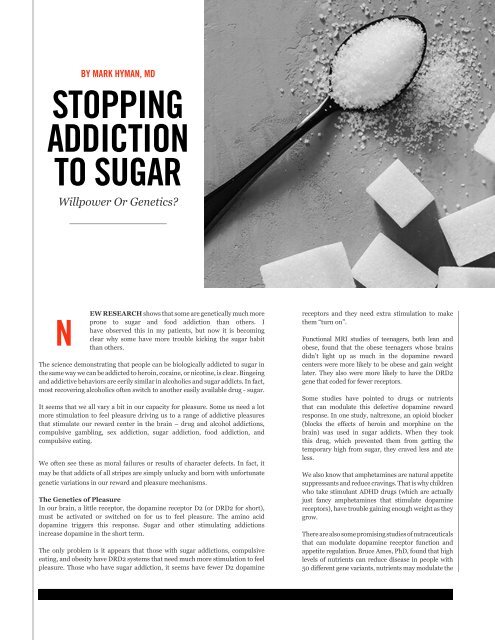24 Seven March 2019
24/seven is a monthly, free magazine for personal growth, professional development, and self-empowerment. The approach is holistic, incorporating mind, body, soul, and spirit. As philosopher Francis Bacon said, “Knowledge is power.” Use this information to live your best life now.
24/seven is a monthly, free magazine for personal growth, professional development, and self-empowerment. The approach is holistic, incorporating mind, body, soul, and spirit. As philosopher Francis Bacon said, “Knowledge is power.” Use this information to live your best life now.
You also want an ePaper? Increase the reach of your titles
YUMPU automatically turns print PDFs into web optimized ePapers that Google loves.
BY MARK HYMAN, MD<br />
STOPPING<br />
ADDICTION<br />
TO SUGAR<br />
Willpower Or Genetics?<br />
N<br />
EW RESEARCH shows that some are genetically much more<br />
prone to sugar and food addiction than others. I<br />
have observed this in my patients, but now it is becoming<br />
clear why some have more trouble kicking the sugar habit<br />
than others.<br />
The science demonstrating that people can be biologically addicted to sugar in<br />
the same way we can be addicted to heroin, cocaine, or nicotine, is clear. Bingeing<br />
and addictive behaviors are eerily similar in alcoholics and sugar addicts. In fact,<br />
most recovering alcoholics often switch to another easily available drug - sugar.<br />
It seems that we all vary a bit in our capacity for pleasure. Some us need a lot<br />
more stimulation to feel pleasure driving us to a range of addictive pleasures<br />
that stimulate our reward center in the brain – drug and alcohol addictions,<br />
compulsive gambling, sex addiction, sugar addiction, food addiction, and<br />
compulsive eating.<br />
We often see these as moral failures or results of character defects. In fact, it<br />
may be that addicts of all stripes are simply unlucky and born with unfortunate<br />
genetic variations in our reward and pleasure mechanisms.<br />
The Genetics of Pleasure<br />
In our brain, a little receptor, the dopamine receptor D2 (or DRD2 for short),<br />
must be activated or switched on for us to feel pleasure. The amino acid<br />
dopamine triggers this response. Sugar and other stimulating addictions<br />
increase dopamine in the short term.<br />
The only problem is it appears that those with sugar addictions, compulsive<br />
eating, and obesity have DRD2 systems that need much more stimulation to feel<br />
pleasure. Those who have sugar addiction, it seems have fewer D2 dopamine<br />
receptors and they need extra stimulation to make<br />
them “turn on”.<br />
Functional MRI studies of teenagers, both lean and<br />
obese, found that the obese teenagers whose brains<br />
didn’t light up as much in the dopamine reward<br />
centers were more likely to be obese and gain weight<br />
later. They also were more likely to have the DRD2<br />
gene that coded for fewer receptors.<br />
Some studies have pointed to drugs or nutrients<br />
that can modulate this defective dopamine reward<br />
response. In one study, naltrexone, an opioid blocker<br />
(blocks the effects of heroin and morphine on the<br />
brain) was used in sugar addicts. When they took<br />
this drug, which prevented them from getting the<br />
temporary high from sugar, they craved less and ate<br />
less.<br />
We also know that amphetamines are natural appetite<br />
suppressants and reduce cravings. That is why children<br />
who take stimulant ADHD drugs (which are actually<br />
just fancy amphetamines that stimulate dopamine<br />
receptors), have trouble gaining enough weight as they<br />
grow.<br />
There are also some promising studies of nutraceuticals<br />
that can modulate dopamine receptor function and<br />
appetite regulation. Bruce Ames, PhD, found that high<br />
levels of nutrients can reduce disease in people with<br />
50 different gene variants, nutrients may modulate the


















